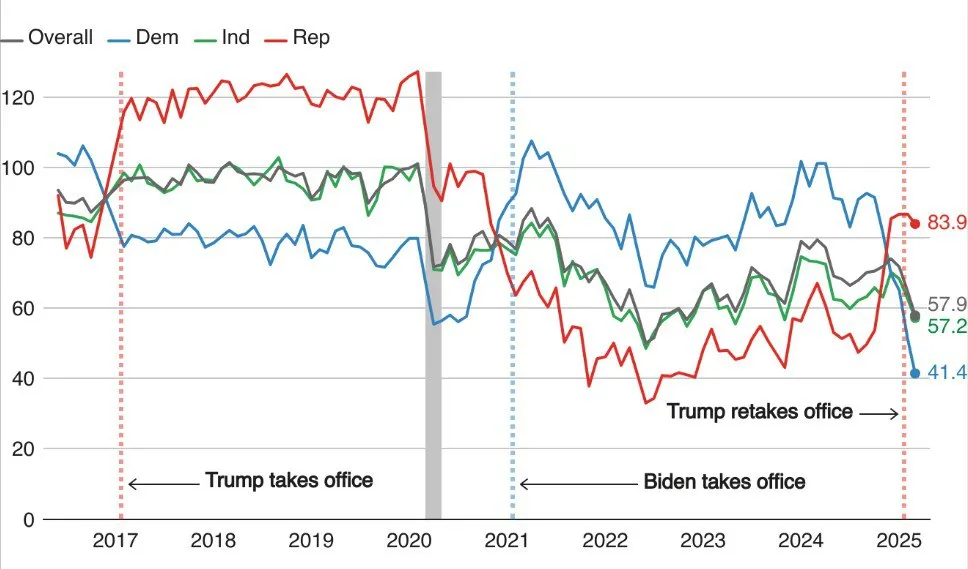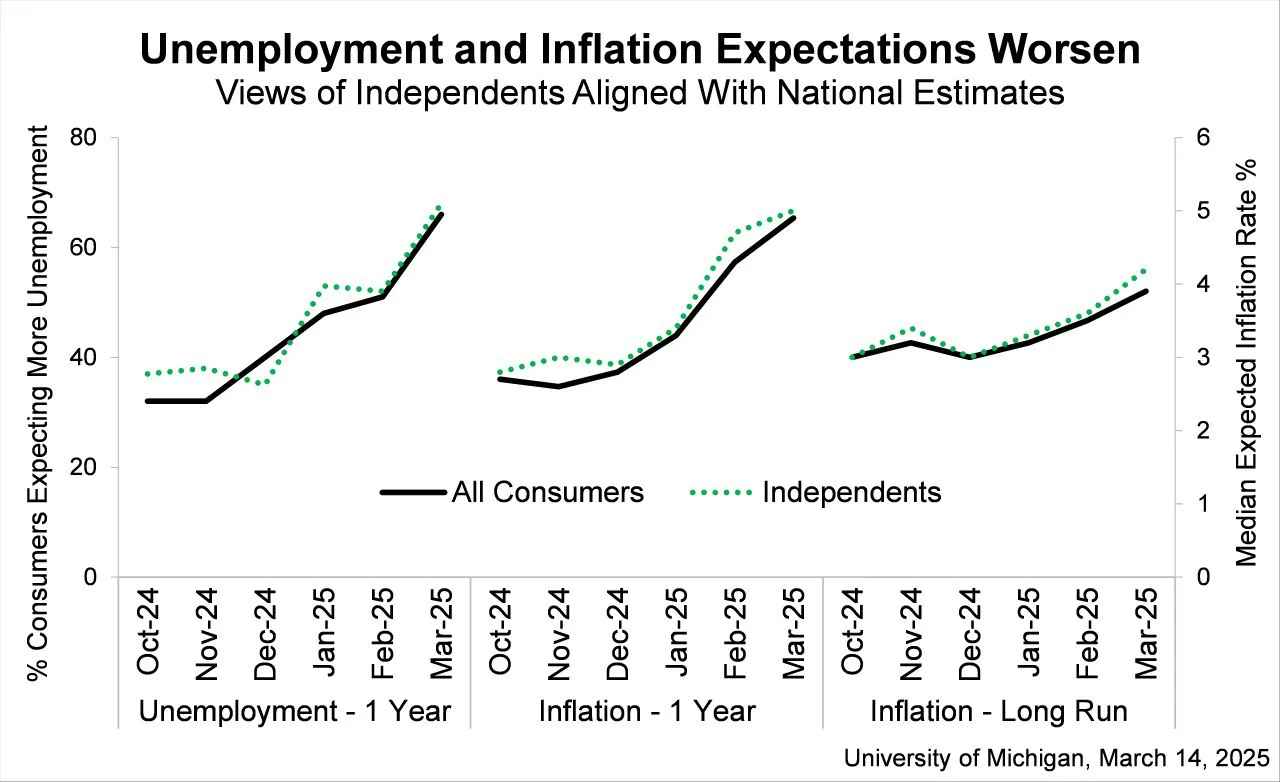The College of Michigan Shopper Sentiment Index reveals that U.S. client sentiment fell to 57.9 in March, exceeding six factors from 64.7 in February.
Feelings fell to lowest ranges in 28 months. That is probably the most sharp drop we’ve got seen since November 2022. The pessimism amongst shoppers is because of a surge in issues about home stags, recessions and worsening attributable to Trump’s financial insurance policies.

Supply: College of Michigan Shopper Survey Shopper Sentiment throughout all political affiliations as of March 2025
Present client sentiment is declining sharply throughout all ages, genders, schooling, revenue, wealth, regional and political affiliations. A Joanne Huss survey of College of Michigan shoppers discovered that client sentiment amongst Republican shoppers has dropped to 83.9. Impartial and Democrats’ client sentiment fell to 57.2 and 41.4 in March, respectively.
The survey reveals that the present decline has been ongoing for the third consecutive month, with falls of twenty-two% in comparison with December 2024. In comparison with March 2024, when client sentiment was 79.4, the year-on-year decline was over 27%. Different metrics, similar to client expectations, have additionally dropped considerably.
The patron expectations index fell from 64.0 in February to 54.2 in March, displaying a 15.3% decline a month in the past. Shopper expectations additionally fell 30% year-on-year, down from 77.4 in March final yr. Republican client expectations fell 10%, whereas independents and Democrats fell 12% and 24% respectively. Shoppers count on that ongoing insurance policies will have an effect on a wide range of financial features, together with private revenue, inventory markets, inflation, employment, and enterprise circumstances.
Shopper inflation expectations enhance whereas reducing
A client survey highlighted a rise in inflation expectations over the following yr, leaping to 4.9% in March to 4.5% in February. The examine outlined that this expectation was the best learn recorded since November 2022, marking a three-month consecutive rise in expectations.
Lengthy-term client inflation expectations skyrocketed from 3.5% in February to three.9% in March. This examine confirmed that this worth was recorded within the highest month recorded since 1993. All political alliances additionally count on unemployment to worsen within the coming months, with expectations rising from underneath 4% to just about 5%.

Supply: College of Michigan Survey on Shopper Inflation and Unemployment Expectations amongst Shoppers in March 2025
US Treasury Secretary Scott Bescent additionally raised extra issues concerning the recession after an announcement from NBC Meet the Press Sunday Present. Bescent stated there isn’t any assure that the recession will probably be prevented. Bescent defined that the federal government is making an entire reset to forestall future monetary disaster, including that market corrections are regular.
U.S. client spending fell 0.2% in January for the primary time in nearly two years. Month-to-month client spending It was dropped Most merchandise embrace cars, leisure actions, meals, drinks, clothes, footwear, and extra. Bills on providers elevated total in January, together with housing, utilities, monetary providers, insurance coverage and lodging. Bills on merchandise fell by $76.7 billion, however in January expenditures on providers elevated by $460 billion.
Shopper sentiment in different economies, together with China, is on the rise, however the US financial system continues to sluggish. Retail gross sales in China It is elevated It was about 4.0% in January and February in comparison with a yr in the past. Home manufacturing additionally surged through the first two months of the yr, beating earlier expectations.
Trump’s tariffs enhance financial well being uncertainty
Trump’s unstable tariff insurance policies have despatched a substantial amount of financial uncertainty by means of the roof and tanking markets. Now that there are fewer visions and apocalypse manufacturers, please. @Motive by way of https://t.co/rab5iblp6x
– Nick Gillespie (@nickgillespie) March 13, 2025
President Trump’s tariffs proceed to boost uncertainties concerning the US financial well being, with the Financial Co-operation and Growth Group (OECD) commenting on the nation’s financial slowdown. OECD Quarterly Report prediction Trump’s insurance policies may plunge into the financial well being of the USA. The report additionally pointed to a pointy decline within the US capital market to the revised zone over the previous few weeks.
Trump’s tariffs are cited as one of many main causes of damaging well being skilled throughout the US market. The president imposed import taxes on items from Canada, Mexico, the EU and China, inflicting a world commerce battle. Trump additionally intends to impose a 25% import tax on international metallic imports, which he believes ought to come into impact on April 2nd.
The OECD described tariffs as “a repetitive, non-taxable menace from Trump,” rising the uncertainty that’s induced throughout companies around the globe. The report argued that uncertainty has change into cautious and cautious amongst companies, and that funding in US small and medium-sized companies, which contributes considerably to the well being of the US financial system, has expressed much less optimism.
NFIB Small Enterprise Optimism Index It is fallen Extra firms cited worsening revenue tendencies, gross sales expectations and issues about financial progress, resulting in 100.7 to over 2% in February. Solely 12% of companies are thought of favorable time to develop their operations.












